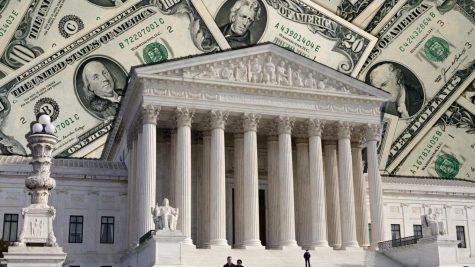The Trade War Is One of Principles, Not Economics
October 9, 2019
I walk into an innocuous store on Hong Mei Road. The baby blue plaque outside advertises children’s toys and its interior sells as such – Lego playsets and knock-off Barbie dolls line the shelves. But unknown to passerby and window shoppers, this store is only a secondary source of income for its proprietor, a lady I have known since the 4th grade.
Mrs. Wu’s (not her real name) primary source of income actually comes from a hidden room on the second floor located next to a rancid restroom, accessible through a secret door. That’s what I’m here for.
She leads me up, and flicks on a light and leads me in. Inside, dimly illuminated, are rows of hundreds of DVD disks. Once advertising with bright neon signs, Mrs. Wu has been forced to hide her movie business for over a year now due to trade war concessions made by the Chinese government to protect US Intellectual Property (IPs).

It would make sense why American companies would complain against such flagrant IP abuse. You could once buy a year’s worth of stolen SAT tests, giving Chinese test takers a leg up. A blue-ray disk in America costs up to $50. In China, they cost less than $2.
Most such stores, which once proliferated in an unregulated marketplace, have been shut down. On this one mile stretch of Hong Mei Road, there once existed five separate brick-and-mortar stores. Now, Mrs. Wu’s is the only one that remains. Some have taken to using WeChat (China’s version of WhatsApp) to continue sales.
Says Mrs. Wu: “The Chinese government has forced me to go into hiding. The store downstairs barely breaks even, and my movie business is only marginally profitable.” Today, the only customers allowed upstairs are long-time clients.
I leave with Alita: Battle Angel, a title that costs me a little over a dollar.
It’s been almost two years since Mr. Trump initiated his first round of tariffs against China, who promptly retaliated in kind. In the time since, there have been escalations on Twitter and trade meetings at the Fairmont Peace Hotel, but no concrete resolution has come to head. Less than two weeks ago, the US raised some tariffs by another 5%.
The results are stark. Last month, American manufacturing activity contracted for the first time in 3 years. Farmers are leaving massive piles of harvest to rot, unable to compete on the global market. Yields on long-term bonds are at all-time lows; universities and Fortune 500 companies are scrambling to issue long-term bonds and lock in ultra-low rates.
Mr. Trump has always maintained that Chinese manufacturing would “crumble,” but it has become clear that any resolution at this point is still far off; neither nation can back off without seeming weak on the world stage.
Through this conflict, we’ve also seen, for lack of a better term, companies (and individuals like Mrs. Wu) adopt creative workarounds. As companies struggle to find comparable supply and distribution chains (spoiler alert: they can’t) in Vietnam and India, many have also undertaken trade cheats.
Some exporters use code-fudging, a strategy that involves switching around the near 20,0000 codes that identify imported goods. In 2018, after Mr. Trump imposed a 25% tariff on steel, imports of steel plates fell 11% while imports of “electric-generating sets,” a turbine classification, grew 121%.
Online forums are rife with players offering advice on what inspection-avoiding tariff codes work for hard-wood plywood, a product that carries a 183.4% tariff; in 2018, softwood plywood imports soared 983%.
Another common practice, called transshipment, involves shipping Chinese products to a nearby third port, minimally processing them, then re-exporting them to the United States as a product originating from the third port. In the past year, Vietnam has experienced an 81% increase in electronic imports from China, and a 72% increase of such exports to the United States.
Important to note is that exports can only exist if the products can also be imported; both Chinese and American firms in tandem are increasingly engaged in legally dubious behaviour.
Trillions of lost dollars later, it can no longer be argued that this trade war is based upon the theoretical economic benefits. In fact, the opposite has occurred – markets are shaky, key industrial markers like oil are down, and the Fed just cut rates for the second time in a few months to combat a potential recession. Both individuals and companies are hurting.
Rather, this war is based off principle – that the United States must stand up to the bully China, and that China must defend her national interests. But as it turns out, for many, principles are worth compromising for economics.





